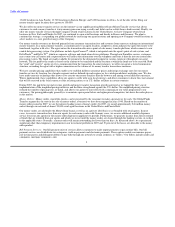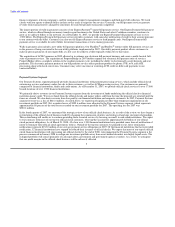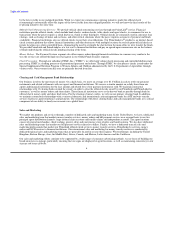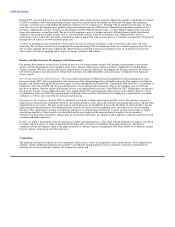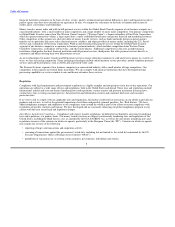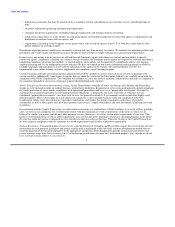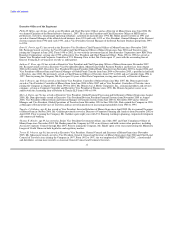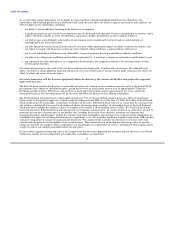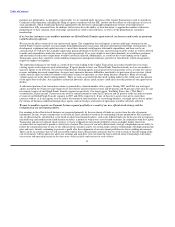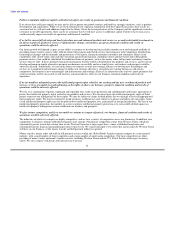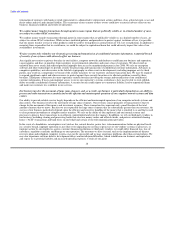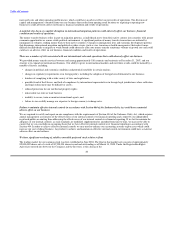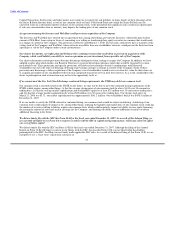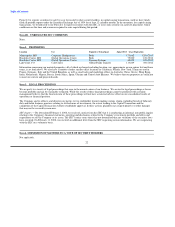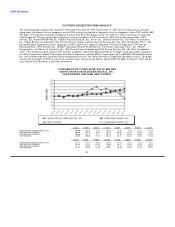MoneyGram 2007 Annual Report Download - page 17
Download and view the complete annual report
Please find page 17 of the 2007 MoneyGram annual report below. You can navigate through the pages in the report by either clicking on the pages listed below, or by using the keyword search tool below to find specific information within the annual report.
Table of Contents
members are independent. As promptly as practicable, we are required under the terms of the Capital Transaction to seek to amend our
Certificate of Incorporation, including the filing of a proxy statement with the SEC and use our best efforts to solicit proxies in favor of
such amendment, which would grant directors appointed by the Investors voting rights proportionate to their ownership interest
calculated on a fully converted basis. In addition, the Investors have the ability, at their discretion, to appoint the number of directors
proportionate to their common stock ownership, calculated on a fully-converted basis, as well as to the proportionate committee
membership.
If we lose key customers or are unable to maintain our Global Funds Transfer agent network, our business and results of operations
could be adversely affected.
We may not be able to retain all of our current retail agents. The competition for retail agents is intense and larger customers in our
Global Funds Transfer segment are increasingly demanding financial concessions and more information technology customization. The
development, equipment and capital necessary to meet these demands could require substantial expenditures and there can be no
assurance that we will have the available capital after paying dividends to the Investors and servicing our debt, or that we will be allowed
to make such expenditures under the terms of our debt agreements. If we were unable to meet these demands, we could lose customers
and our business and results of operations would be adversely affected. Additionally, as a result of the events leading to the Capital
Transaction, agents have asked for certain funding arrangements and special remittance patterns for their benefit, which arrangements
negatively impact our liquidity.
The reputational damage to our brand as a result of the events leading to the Capital Transaction may make it harder for us to retain
existing agents or develop new agent relationships. If agents decide to leave our Global Funds Transfer network, or if we are unable to
sign new agents to our network, our revenue would decline. Existing agents may generate fewer transactions or less revenue for various
reasons, including increased competition. An agent may encounter business difficulties unrelated to its provision of our services, which
could cause the agent to reduce its number of locations or hours of operation, or cease doing business altogether. Many of our high
volume agents are in the check cashing industry. There are risks associated with the check cashing industry that could cause this portion
of our agent base to decline. Any regulatory action that adversely affects check cashers could also cause this portion of our agent base to
decline.
A substantial portion of our transaction volume is generated by a limited number of key agents. During 2007 and 2006, our ten largest
agents accounted for 36 percent and 34 percent of our total fee and investment revenue and 49 percent and 48 percent of the total fee and
investment revenue of our Global Funds Transfer segment, respectively. Our largest agent, Wal-Mart Stores, Inc. ("Wal-Mart"),
accounted for 20 percent and 17 percent of our total fee and investment revenue and 27 percent and 24 percent of the fee and investment
revenue of our Global Funds Transfer segment in 2007 and 2006, respectively. If any of these key agents were not to renew their
contracts with us, or if such agents were to reduce the number of their locations, or cease doing business, we might not be able to replace
the volume of business conducted through these agents, and our business and results of operations would be adversely affected.
We may be unable to operate our Payment Systems segment profitably as a result of our new official check strategy and the
realignment of our investment portfolio.
Our earnings in the official check business are generated primarily by the investment of funds we receive from the sale of payment
instruments. In turn, we pay commissions to our official check customers based on the outstanding balance produced by that customer's
sale of official checks, calculated at a rate based on short term financial indices, such as the federal funds rate. In the past our investments
included long- and medium-term fixed income securities, a portion of which were asset-backed securities. In conjunction with the Capital
Transaction and our new official check strategy, we have realigned our investment portfolio to focus on highly liquid, short-term
securities that are expected to produce a lower rate of return. The success of our new official check strategy is dependent on our ability to
reduce the commissions that we pay to our official check customers and to exit certain large customer relationships with high commission
rates and costs, thereby continuing to generate a profit after the realignment of our investment portfolio into lower yielding investments.
There can be no assurance that we will successfully reprice those official check customers that we wish to retain or that the timing of the
exit of customers will not adversely affect our earnings and cash flow. Our exit from the largest official check relationships will reduce
our revenue and operating income in the short term, with no initial replacement for such revenue.
14


